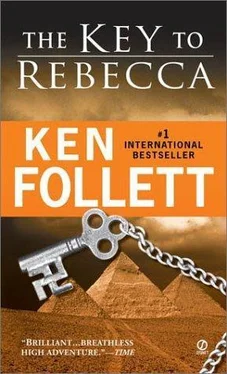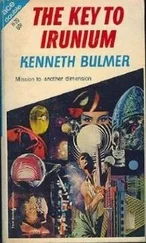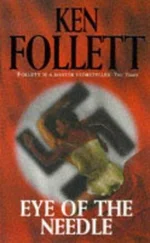Ken Follett - The Key to Rebecca
Здесь есть возможность читать онлайн «Ken Follett - The Key to Rebecca» весь текст электронной книги совершенно бесплатно (целиком полную версию без сокращений). В некоторых случаях можно слушать аудио, скачать через торрент в формате fb2 и присутствует краткое содержание. Жанр: Шпионский детектив, на английском языке. Описание произведения, (предисловие) а так же отзывы посетителей доступны на портале библиотеки ЛибКат.
- Название:The Key to Rebecca
- Автор:
- Жанр:
- Год:неизвестен
- ISBN:нет данных
- Рейтинг книги:4 / 5. Голосов: 1
-
Избранное:Добавить в избранное
- Отзывы:
-
Ваша оценка:
- 80
- 1
- 2
- 3
- 4
- 5
The Key to Rebecca: краткое содержание, описание и аннотация
Предлагаем к чтению аннотацию, описание, краткое содержание или предисловие (зависит от того, что написал сам автор книги «The Key to Rebecca»). Если вы не нашли необходимую информацию о книге — напишите в комментариях, мы постараемся отыскать её.
The Key to Rebecca — читать онлайн бесплатно полную книгу (весь текст) целиком
Ниже представлен текст книги, разбитый по страницам. Система сохранения места последней прочитанной страницы, позволяет с удобством читать онлайн бесплатно книгу «The Key to Rebecca», без необходимости каждый раз заново искать на чём Вы остановились. Поставьте закладку, и сможете в любой момент перейти на страницу, на которой закончили чтение.
Интервал:
Закладка:
After a moment Ishmael turned away, and took the case to his tent. Achmed fetched a little water in a bowl. He opened another bag, and took out a small piece of soap, a brush, a mirror and a razor. He stuck the mirror in the sand, adjusted it, and began to unwind the howli from around his head.
The sight of his own face in the mirror shocked him.
His strong, normally clear forehead was covered with sores. His eyes were hooded with pain and lined in the corners. The dark beard grew matted and unkempt on his fine-boned cheeks, and the skin of his large hooked nose was red and split. He parted his blistered lips and saw that his fine, even teeth were filthy and stained.
He brushed the soap on and began to shave.
Gradually his old face emerged. It was strong rather than handsome, and normally wore a look which he recognized, in his more detached moments, to be faintly dissolute; but now it was simply ravaged. He had brought a small phial of scented lotion across hundreds of miles of desert for this moment, but now he did not put it on because he knew it would sting unbearably. He gave it to a girl-child who had been watching him, and she ran away, delighted with her prize.
He carried his bag into Ishmael’s tent and shooed out the women. He took off his desert robes and donned a white English shirt, a striped tie, gray socks and a brown checked suit. When he tried to put on the shoes he discovered that his feet had swollen: it was agonizing to attempt to force them into the hard new leather. However, he could not wear his European suit with the improvised rubber-tire sandals of the desert. In the end he slit the shoes with his curved knife and wore them loose.
He wanted more: a hot bath, a haircut, cool soothing cream for his sores, a silk shirt, a gold bracelet, a cold bottle of champagne and a warm soft woman. For those he would have to wait.
When he emerged from the tent the nomads looked at him as if he were a stranger. He picked up his hat and hefted the two remaining cases—one heavy, one light. Ishmael came to him carrying a goatskin water bottle. The two cousins embraced.
Achmed took a wallet from the pocket of his jacket to check his papers. Looking at the identity card, he realized that once again he was Alexander Wolff, age thirty-four, of Villa les Oliviers, Garden City, Cairo, a businessman, race—European.
He put on his hat, picked up his cases and set off in the cool of the dawn to walk across the last few miles of desert to the town.
The great and ancient caravan route, which Wolff had followed from oasis to oasis across the vast empty desert, led through a pass in the mountain range and at last merged with an ordinary modem road. The road was like a line drawn on the map by God, for on one side were the yellow, dusty, barren hills, and on the other were lush fields of cotton squared off with irrigation ditches. The peasants, bent over their crops, wore galabiyas, simple shifts of striped cotton, instead of the cumbersome protective robes of the nomads. Walking north on the road, smelling the cool damp breeze off the nearby Nile, observing the increasing signs of urban civilization, Wolff began to feel human again. The peasants dotted about the fields came to seem less like a crowd. Finally he heard the engine of a car, and he knew he was safe.
The vehicle was approaching him from the direction of Assyut, the town. It came around a bend and into sight, and he recognized it as a military jeep. As it came closer he saw the British Army uniforms of the men in it, and he realized he had left behind one danger only to face another.
Deliberately he made himself calm. I have every right to be here, he thought. I was born in Alexandria. I am Egyptian by nationality. I own a house in Cairo. My papers are all genuine. I am a wealthy man, a European and a German spy behind enemy lines—
The jeep screeched to a halt in a cloud of dust. One of the men jumped out. He had three cloth pips on each shoulder of his uniform shirt: a captain. He looked terribly young, and walked with a limp.
The captain said: “Where the devil have you come from?”
Wolff put down his cases and jerked a thumb back over his shoulder. “My car broke down on the desert road.”
The captain nodded, accepting the explanation instantly: it would never have occurred to him, or to anyone else, that a European might have walked here from Libya. He said: “I’d better see your papers, please.”
Wolff handed them over. The captain examined them, then looked up. Wolff thought: There has been a leak from Berlin, and every officer in Egypt is looking for me; or they have changed the papers since last time I was here, and mine are out of date; or—
“You look about all in, Mr. Wolff,” the captain said. “How long have you been walking?”
Wolff realized that his ravaged appearance might get some useful sympathy from another European. “Since yesterday afternoon,” he said with a weariness that was not entirely faked. “I got a bit lost.”
“You’ve been out here all night?” The captain looked more closely at Wolff’s face. “Good Lord, I believe you have. You’d better have a lift with us.” He turned to the jeep. “Corporal, take the gentleman’s cases.”
Wolff opened his mouth to protest, then shut it again abruptly. A man who had been walking all night would be only too glad to have someone take his luggage. To object would not only discredit his story, it would draw attention to the bags. As the corporal hefted them into the back of the jeep, Wolff realized with a sinking feeling that he had not even bothered to lock them. How could I be so stupid? he thought. He knew the answer. He was still in tune with the desert, where you were lucky to see other people once a week, and the last thing they wanted to steal was a radio transmitter that had to be plugged in to a power outlet. His senses were alert to all the wrong things: he was watching the movement of the sun, smelling the air for water, measuring the distances he was traveling, and scanning the horizon as if searching for a lone tree in whose shade he could rest during the heat of the day. He had to forget all that now, and think instead of policemen and papers and locks and lies.
He resolved to take more care, and climbed into the jeep.
The captain got in beside him and said to the driver: “Back into town.”
Wolff decided to bolster his story. As the jeep turned in the dusty road he said: “Have you got any water?”
“Of course.” The captain reached beneath his seat and pulled up a tin bottle covered in felt, like a large whiskey flask. He unscrewed the cap and handed it to Wolff.
Wolff drank deeply, swallowing at least a pint. “Thanks,” he said, and handed it back.
“Quite a thirst you had. Not surprising. Oh, by the way—I’m Captain Newman.” He stuck out his hand.
Wolff shook it and looked more closely at the man. He was young—early twenties, at a guess—and fresh-faced, with a boyish forelock and a ready smile; but there was in his demeanor that weary maturity that comes early to fighting men. Wolff asked him: “Seen any action?”
“Some.” Captain Newman touched his own knee. “Did the leg at Cyrenaica, that’s why they sent me to this one-horse town.” He grinned. “I can’t honestly say I’m panting to get back into the desert, but I’d like to be doing something a bit more positive than this, minding the shop hundreds of miles from the war. The only fighting we ever see is between the Christians and the Moslems in the town. Where does your accent come from?”
The sudden question, unconnected with what had gone before, took Wolff by surprise. It had surely been intended to, he thought: Captain Newman was a sharp-witted young man. Fortunately Wolff had a prepared answer. “My parents were Boers who came from South Africa to Egypt. I grew up speaking Afrikaans and Arabic.” He hesitated, nervous of overplaying his hand by seeming too eager to explain. “The name Wolff is Dutch, originally; and I was christened Alex after the town where I was born.”
Читать дальшеИнтервал:
Закладка:
Похожие книги на «The Key to Rebecca»
Представляем Вашему вниманию похожие книги на «The Key to Rebecca» списком для выбора. Мы отобрали схожую по названию и смыслу литературу в надежде предоставить читателям больше вариантов отыскать новые, интересные, ещё непрочитанные произведения.
Обсуждение, отзывы о книге «The Key to Rebecca» и просто собственные мнения читателей. Оставьте ваши комментарии, напишите, что Вы думаете о произведении, его смысле или главных героях. Укажите что конкретно понравилось, а что нет, и почему Вы так считаете.












